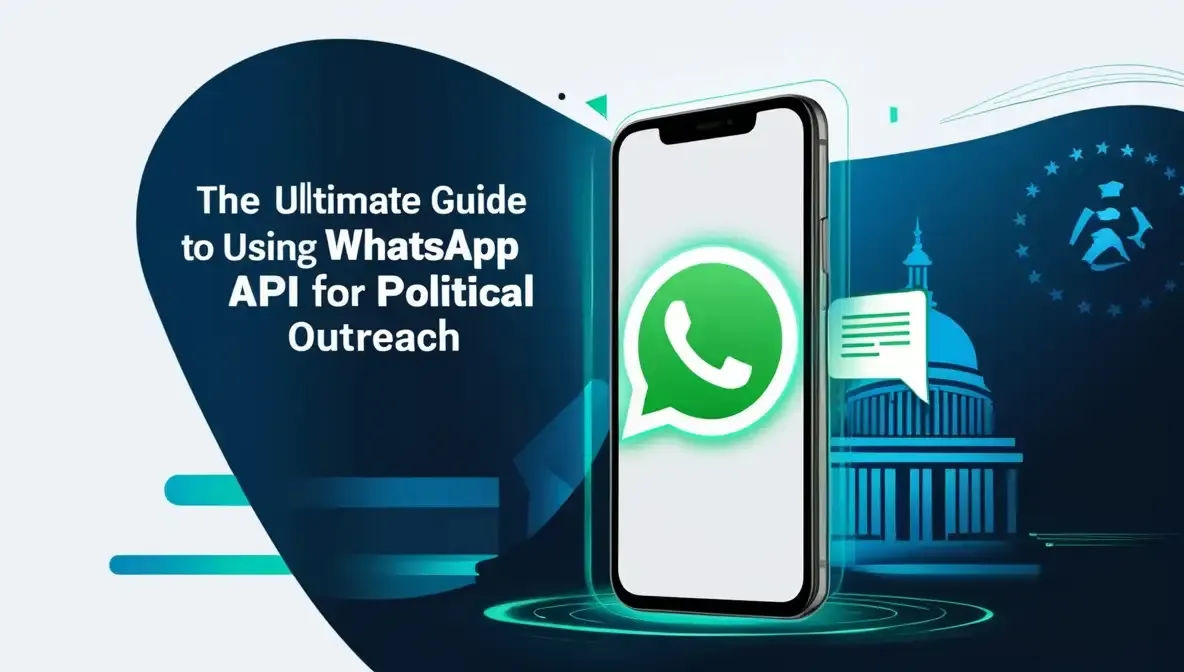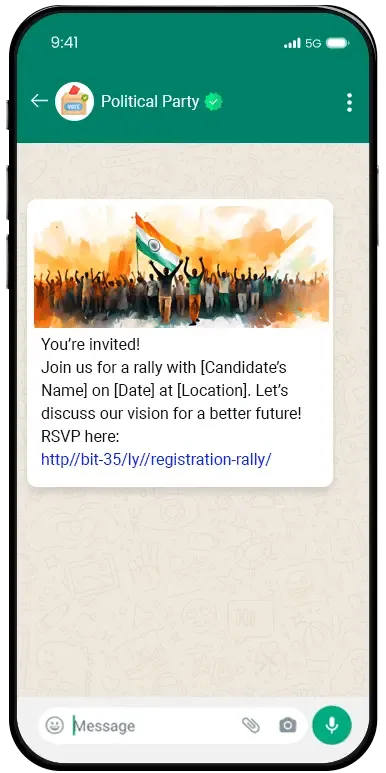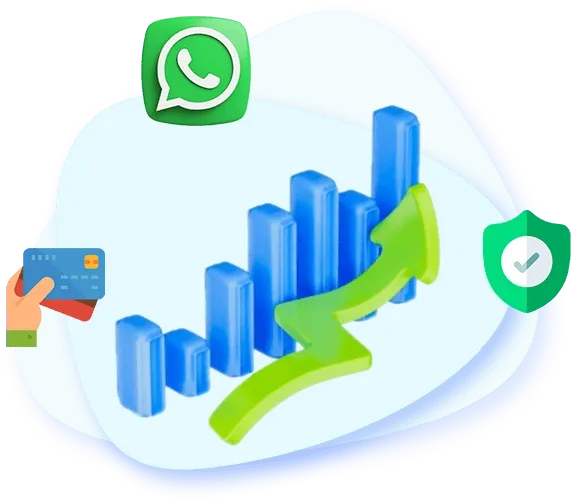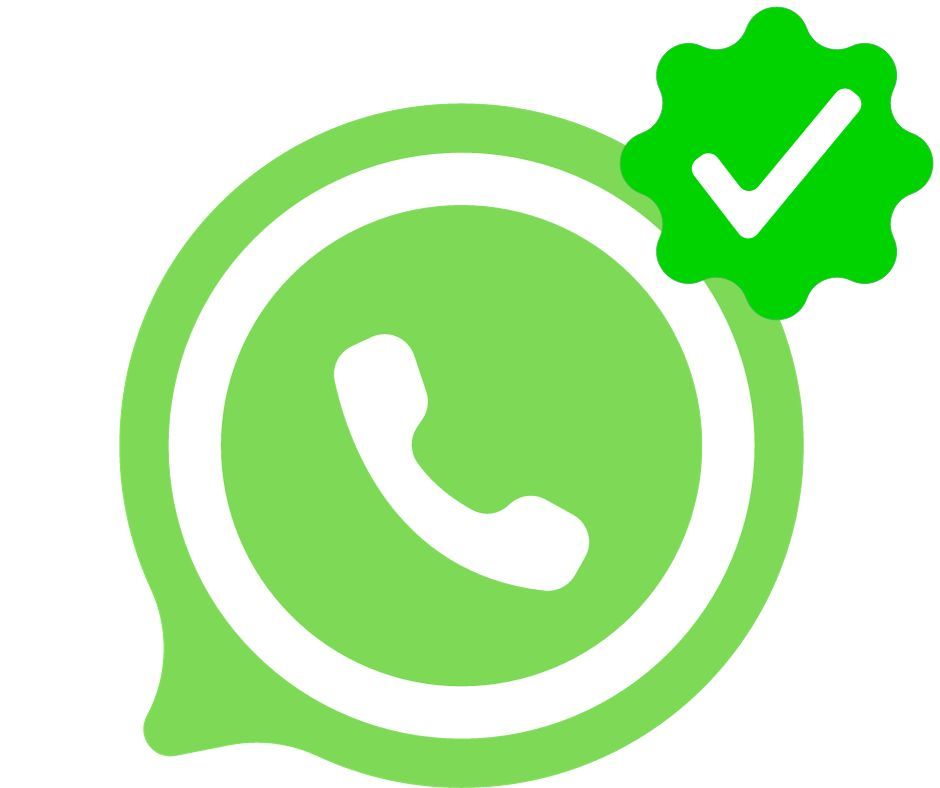
Blog
The Ultimate Guide to Using WhatsApp API for Political Outreach
Discover the best practices for using WhatsApp API in political campaigns to boost voter engagement and drive successful outreach.
A
Abhishek Prakash
•Strategic sales leader with deep focus on customer relationship building and revenue growth. With over two decades of experience at corporates like IBM, Bharti Airtel, and Reliance Jio, driving excellence in enterprise profitability and competitive advantage.
Maximize Voter Engagement with WhatsApp API: A Complete Guide for Political Campaigns
In India, WhatsApp is a powerful tool, connecting over 400 million users daily—making it one of the most widely used communication platforms in the country. During election season, political campaigns leverage WhatsApp’s expansive reach to engage voters instantly and effectively. With the WhatsApp API, political campaigns can take this outreach to the next level. Unlike regular messaging, the API enables campaigns to send real-time, tailored messages to millions of voters, enhancing engagement and building strong voter connections when it matters most. In this guide, we’ll show you how to use the WhatsApp API to power your campaign’s voter engagement. You’ll learn about its unique features, setup steps, and best practices to create meaningful, compliant outreach that resonates with your audience.
In this guide, we’ll show you how to use the WhatsApp API to power your campaign’s voter engagement. You’ll learn about its unique features, setup steps, and best practices to create meaningful, compliant outreach that resonates with your audience.
What is WhatsApp API and Why It’s Essential for Political Campaigns
What is WhatsApp API?
The WhatsApp API is a messaging solution designed for large-scale communication, ideal for enterprises and organizations that need to reach vast audiences efficiently. Unlike the standard WhatsApp Business app, which is limited to individual or small business use, the API offers advanced automation and integration capabilities.
This allows political campaigns to send large volumes of messages, automate responses, and manage interactions seamlessly through CRM systems—all essential for running a dynamic, responsive campaign.
Unlike the standard WhatsApp Business app, which is limited to individual or small business use, the API offers advanced automation and integration capabilities.
This allows political campaigns to send large volumes of messages, automate responses, and manage interactions seamlessly through CRM systems—all essential for running a dynamic, responsive campaign.
Benefits of WhatsApp API for Political Campaigns

Scalability:
WhatsApp API enables campaigns to reach large numbers of voters simultaneously, using automated broadcast messages that ensure consistent, widespread outreach. This makes it a powerful tool for campaigns looking to communicate efficiently without manual intervention.Enhanced Engagement:
The API allows campaigns to send media-rich content, such as images, videos, and documents, directly to voters’ phones. This multimedia approach can be highly effective for sharing campaign slogans, manifestos, or candidate profiles, keeping voters engaged and informed through visually appealing and impactful content.Personalization:
With WhatsApp API, campaigns can create personalized messaging experiences at scale. By customizing message content based on voter data—such as location, language, or interests—campaigns can foster a conversational connection that feels relevant and personal, increasing voter trust and interest.Compliance and Security:
Security and compliance are crucial, especially in political messaging. WhatsApp API provides a secure platform for sharing information, ensuring messages are encrypted and delivered only to opt-in recipients. Additionally, WhatsApp’s compliance policies help campaigns avoid potential issues with spam or unauthorized messaging, which could harm the campaign’s credibility.Key Features of WhatsApp API for Political Outreach
Automated Messaging
Rich Media Messaging
- Images: Share candidate photos, campaign banners, or issue-based infographics.
- Videos: Send impactful videos highlighting campaign promises, voter testimonials, or event coverage.
- Interactive Buttons: Include buttons that allow voters to respond instantly, register for events, or learn more about specific topics.
Two-Way Communication
Broadcast Lists and Segmentation
- Location-based Segmentation: Send location-specific updates or event reminders to voters in a particular region.
- Interest-based Segmentation: Target groups interested in specific issues with content addressing those topics.
How to Set Up WhatsApp API for Your Election Campaign

Step 1: Partner with an Official WhatsApp API Provider
To begin using the WhatsApp API, campaigns must partner with an official provider like Mtalkz. Providers play an essential role in setting up the API, managing infrastructure, and ensuring compliance with WhatsApp’s guidelines. At Mtalkz, the onboarding process is streamlined to help campaigns get up and running quickly. This involves verifying the campaign’s business information, selecting message templates, and configuring the initial settings.Step 2: Obtain Necessary Approvals
WhatsApp requires that campaigns adhere to strict compliance guidelines, especially for sensitive political messaging. Campaigns must submit message templates for approval, ensuring that content aligns with WhatsApp’s policies and does not violate terms around unsolicited messaging. This step is crucial to maintain trust and ensure smooth communication with voters. Working with an experienced provider like Mtalkz can simplify this approval process, as they guide campaigns on compliant message formats and help them navigate regulatory requirements.Step 3: Configure Messaging Workflows
Once approved, campaigns can start setting up automated messaging workflows. This includes defining sequences for voter outreach, such as:- Welcome Messages for new opt-ins,
- Event Invitations for rallies or webinars,
- Reminder Messages for important dates like voting deadlines or campaign events.
Step 4: Integrate with CRM Systems
Integrating WhatsApp API with CRM software is essential for managing and tracking voter interactions efficiently. This connection enables campaigns to view interaction histories, segment audiences, and tailor messages based on voter data, all within a single interface. With a CRM-linked setup, campaigns can streamline follow-ups, record feedback, and make data-driven adjustments to improve voter engagement. This integration ensures that every interaction contributes to a stronger, data-informed campaign strategy.Best Practices for Using WhatsApp API in Political Campaigns

Obtain Explicit Consent from Voters
Before sending any messages, ensure that you have explicit consent from voters to communicate with them via WhatsApp. This opt-in process is vital not only for compliance with WhatsApp’s policies but also for building trust with your audience. Offer easy opt-in methods such as text-based registration or simple web forms.Personalize Messages for Better Engagement
Personalization is key to increasing engagement and fostering a connection with voters. Use the data from your CRM system to send tailored messages, addressing voters by name, referencing their specific locations or issues that matter most to them. Personalized outreach feels more relevant and increases the likelihood of a positive response.Keep Messages Clear and Concise
Political messages should be direct and easy to understand. Avoid long paragraphs and unnecessary jargon. Use bullet points, short sentences, and clear calls to action (CTAs) to ensure your message is both digestible and compelling. In political campaigns, where time and attention are limited, clarity is crucial.Optimize for Mobile Devices
Given that WhatsApp is a mobile-first platform, ensure that your messages are optimized for smartphones. This includes ensuring that any media content like images or videos is mobile-friendly and loads quickly. Additionally, make sure any links you share are accessible and easy to click on mobile devices.Maintain Consistency Across Channels
WhatsApp should be just one part of your overall multi-channel strategy. Ensure that messaging across all channels (SMS, email, voice, etc.) aligns with your campaign’s key messages and tone. Consistent communication fosters a cohesive campaign experience and avoids confusion among voters.Be Responsive and Interactive
Encourage two-way communication by responding to voter queries in real time. Set up automated replies for common questions, but always ensure that there is a human touch when necessary. Engagement is a two-way street, and showing voters that you care about their concerns strengthens their connection to your campaign.Respect Message Frequency and Timing
Avoid overwhelming voters with too many messages. Be mindful of the frequency and timing of your outreach, especially during busy election periods. Test message timings to find out when voters are most likely to engage, and use that data to optimize message delivery schedules.Monitor and Analyze Campaign Performance
Regularly review key performance indicators (KPIs) such as message open rates, engagement rates, and responses. Use this data to adjust your strategy and improve the overall effectiveness of your WhatsApp campaigns. Platforms like Mtalkz offer in-depth analytics that can help you track campaign success and make data-driven decisions.Compliance and Ethical Considerations for Political Campaigns
Respecting User Privacy
 User privacy is paramount when conducting political outreach. WhatsApp requires campaigns to secure explicit opt-in consent from users before initiating contact. This means campaigns must only message voters who have voluntarily opted in to receive updates.
Furthermore, campaigns should avoid sharing or storing sensitive data improperly, as voter trust is built on respecting their privacy and choices.
By maintaining transparency in how voter data is collected and used, campaigns can foster a more trusting relationship with their audience.
User privacy is paramount when conducting political outreach. WhatsApp requires campaigns to secure explicit opt-in consent from users before initiating contact. This means campaigns must only message voters who have voluntarily opted in to receive updates.
Furthermore, campaigns should avoid sharing or storing sensitive data improperly, as voter trust is built on respecting their privacy and choices.
By maintaining transparency in how voter data is collected and used, campaigns can foster a more trusting relationship with their audience.
Staying Within WhatsApp’s Usage Policy
 WhatsApp has strict policies against spamming, and violating these can lead to penalties, including suspension of service.
Political campaigns should use the platform responsibly, avoiding high-frequency, irrelevant, or overly promotional messages that may lead to voter frustration or disengagement.
Working with a trusted API provider like Mtalkz can help ensure that campaigns follow best practices for message frequency, relevancy, and compliance, helping campaigns avoid the pitfalls of platform misuse and safeguard their communication channels.
WhatsApp has strict policies against spamming, and violating these can lead to penalties, including suspension of service.
Political campaigns should use the platform responsibly, avoiding high-frequency, irrelevant, or overly promotional messages that may lead to voter frustration or disengagement.
Working with a trusted API provider like Mtalkz can help ensure that campaigns follow best practices for message frequency, relevancy, and compliance, helping campaigns avoid the pitfalls of platform misuse and safeguard their communication channels.
Transparency and Honesty
Measuring the Impact of WhatsApp API on Political Outreach
Tracking Key Metrics
To understand the effectiveness of WhatsApp API in political outreach, it’s essential to monitor key engagement metrics:- Engagement Rate: Measure how many voters actively engage with messages by responding, clicking links, or interacting with multimedia. High engagement rates suggest messages are relevant and resonate with the audience.
- Message Open Rate: Track the percentage of voters who open campaign messages to gauge overall interest and reach. This metric is particularly useful in determining the initial impact of messages and their visibility.
- Response Time: Monitor the time taken by the campaign to respond to voter queries or feedback. Faster response times demonstrate attentiveness and enhance voter experience, building trust and fostering stronger connections.
A/B Testing Campaign Messages
A/B testing allows campaigns to experiment with different messaging styles, content, and formats to determine what works best with voters. For example, campaigns can test:- Message Tone: Comparing formal vs. conversational messaging to see which approach is more effective.
- Content Types: Testing messages with multimedia (e.g., images or videos) against text-only messages.
- Call-to-Action: Trying different CTAs (e.g., “Learn More” vs. “Join the Rally”) to see which prompts higher voter interaction.